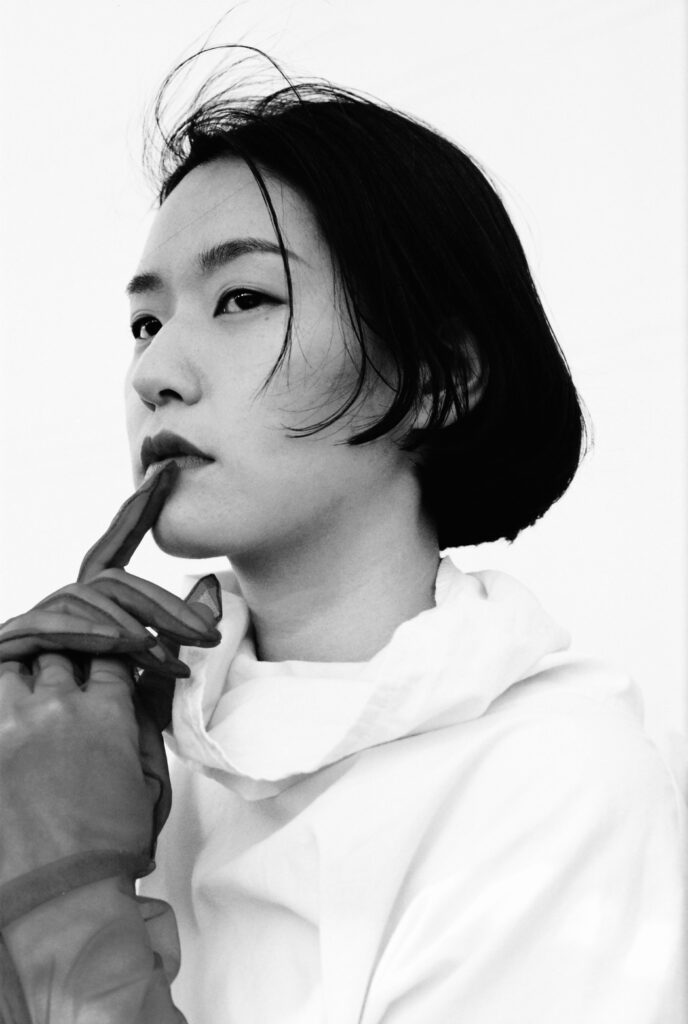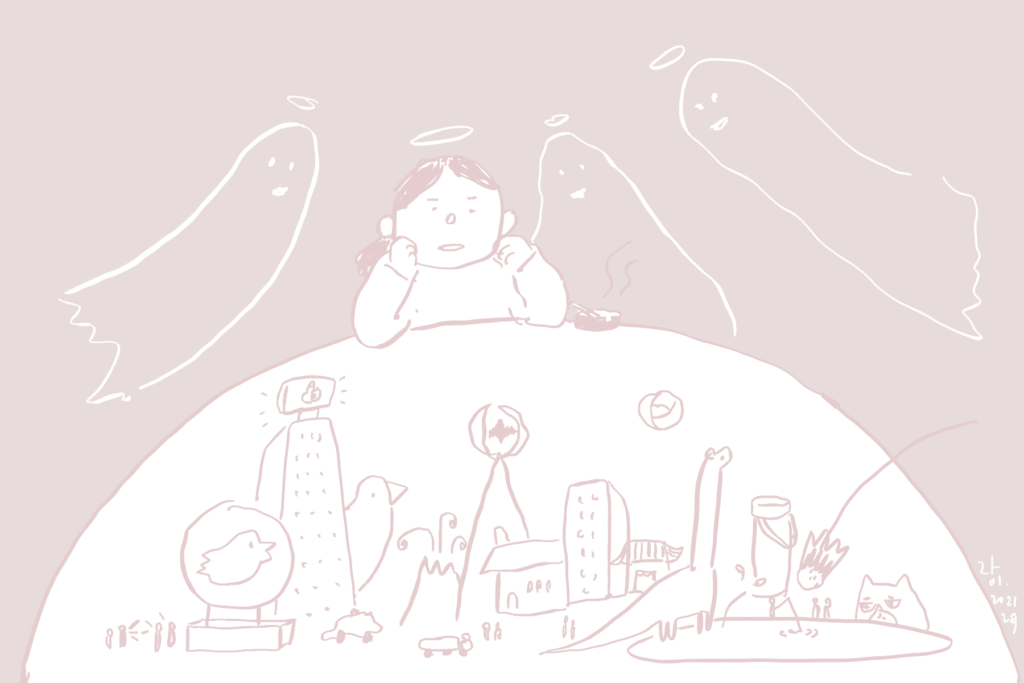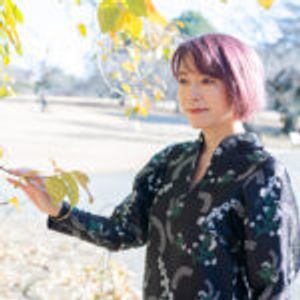Lang Lee is an artist from Seoul who demonstrates her many talents through music, film, comics, novels, and essays. As someone whose creative work extends beyond national borders, what did 2020, a year which forced people to exercise “self-restraint,” look like for her? I talked to Lang Lee about her work management style which challenges society’s impression of artists, the recent money fad in Korean society, and how she approaches social media.

――Your novel collection, “How to name the duck,” was published in Japan in 2020. This was the first time I read your writing, and the fact that you put yourself on the same level as the reader in all your work shattered the impression I had of artists.
Lang Lee: People throughout the world have a similar impression of artists, don’t they? Like they’re detached from the real world and aren’t good at earning a living.
――Our interview today is remote, and you’re joining in from a co-working space. That doesn’t look so artist-like either.
Lang Lee: Sometimes for magazines or TV interviews, they tell me, “We’d like to capture the life of an artist,” and are surprised when I reply, “Every day, I sit here and do nothing but use my computer.” I like Post-its, and I put up a lot of them around my computer. Like what day a piece is due, or when a meeting is scheduled. I also have a note that says, “Be careful about using ‘once,’ ‘just,’ and ‘very,’ because you tend to overuse them when writing.”
――When it comes to managing your work, is that something you learned from the industry?
Lang Lee: I don’t see anyone around me doing this kind of stuff. I think it’s fun to create “bunryu” [분류: Korean for “category”]. I use a tool called Notion to keep track of my work projects, schedule, the amount of money I’m paid, etc. I create multiple tags for different kinds of work and create bunryu for each job. All my e-mails are also in bunryu. Emails from publishers are pink, record companies are red, and events are green. There’s one important bunryu: Yellow is “work I’ve turned down.” I’m a freelancer, so I’m always worried about when the work will stop. In times where I don’t have work, I look at that folder, and suggest, “I can do it now.”
――If your schedule allows it, do you take on most work?
Lang Lee: There are a lot of jobs I turn down because of scheduling or money issues. If I want to do something but the rate is too low, I tell the person that, and they either get subsidies or reach out again when they’re able to pay more. All of that management and negotiation is part of my job too, so I can’t just lie around and only think about art. (laughs)
What Lang Lee realized from working in insurance sales
――I read in a past article that in the spring of 2020, you started working at an insurance company, where you became a insurance policy designer and advise people on insurance products. This is a completely different field from your main work—why did you start working there?
Lang Lee: I started studying for the freelancers around me, rather than for the money. In 2019, one of my very good friends, who is my age, was diagnosed with cancer. After we found out he had cancer, my friends and I teamed up to start a mailing service and supported our friend with the money we received from subscribers for about six months. But we couldn’t get that much money from each subscriber, and it was hard to keep it going as a project. I thought about what I could do next, and what options freelancers like us with no savings and unstable income have if we become unable to work. That’s when I became interested in insurance. I was given a special privilege as an artist where I’m paid on commission and don’t have to commute to the office, but I think I’d probably be fired if I couldn’t get any contracts. (laughs)
――Are you suggesting insurance products to customers who contact your company?
Lang Lee: I’ve talked about how I got my insurance certification on the radio and podcasts, so my fans often reach out to me. Also, my artist friends. I get a commission when a customer signs up for my company’s products. One thing led to another, and I became an insurance policy designer for minorities. Over 90% of my clients are women, and many gay and unmarried people come to me for consultations.
――Is there a gap between those people’s needs and the available insurance plans?
Lang Lee: That’s right. For example, if you’re married with kids, a death benefit is the most important kind of insurance, but if you’re unmarried, you don’t need that. And in the case of gay couples, they may not be able to get the necessary documents to collect the benefit. For example, the law says that the beneficiary of the death benefit can be someone outside of the legal family, but only the legal family can obtain the death certificate needed to collect the benefit. That’s why I’m doing a lot of research and proposing that perhaps a different kind of insurance payout is better for those people.

Why are people in Korea talking about money?
――Has the spread of the coronavirus affected your workload as an artist?
Lang Lee: I was very affected by it. I had overseas events scheduled, but all my plans from March on were canceled. In June and July, the number of infected people went down, and I was starting to make plans for fall, but there was a Christian church service in August and the infections suddenly increased. From September to October, infections went down, and then they went up again in November. It was like a rollercoaster, and I felt a bit all over the place mentally. When I look at my income for each category of work on Notion, my number one income category in 2019 was live shows, but in 2020, it became writing fees. Even if I work really hard to write a piece, each one pays about 15,000 yen. That’s less than one-tenth of a performance fee for a live show. So if the writing fees are ranked number one despite that, my overall income must have dropped. I thought, maybe if I can get contract money…so I got contracts for all kinds of books.
――Your second essay collection was published last year in Korea.
Lang Lee: If you directly translated the title, it would be, “Money is necessary even for jobs you love.” It’s not really a book about money. While talking about my life, I happen to talk about writing fees or how I sold my trophies, but it was decided that the book would be sold as “a collection of essays about money,” which I’m a bit unsure about. The reason that happened was because in 2020, money was a major theme in Korean society overall. I guess because more people can’t go out and work due to corona, they want to grow the money they already have. Even on TV, variety shows where celebrities sell and buy stocks live and compete over the results were popular, so even bookstores had to push the money angle or people wouldn’t pick up the books.
――Based on seeing the Korean books that are translated into Japanese, I’d have thought that books dealing with feminism and social issues sold well. I had no idea that trend had emerged.
Lang Lee: Feminism and money aren’t unrelated either. Do you know 4B?
――That’s the “no dating, no sex, no marriage, no children” movement that’s mainly gaining popularity among Korean women in their 20s, yeah?
Lang Lee: The women who are steadfast in their support of 4B are proactively telling women to go vote, form a political party, and hold power so women can be empowered to live on their own, and within that movement, there’s been more talk about making money, too. I mentioned it earlier, but if you look at insurance products, there aren’t options for unmarried people, and even the housing benefit, which newly married couples are eligible for, doesn’t exist for unmarried people. Last year, there was a strong trend for unmarried people to work hard to make money and buy a house on their own.
On the internet, individuals are seen as part of a group
――What’s your stance on those trends in feminism?
Lang Lee: Hmm…unfortunately, some feminists treat me like the enemy. This is because even within 4B, some of the people with really radical beliefs are going so far as to exclude transgender women and heterosexual women. People like me, who have a male partner and transgender friends, are attacked on social media. I’m not married, but people have even mistaken me for married and said hateful things. This isn’t only a problem in feminism—I think it’s because opinions have become divided on all kinds of things in society. There’s also a strong tendency for people to only follow people who say what they want to hear.
――Do you mean the “filter bubble” is getting stronger?
Lang Lee: In Korea, there’s a growing trend of “chain blocking,” where if people come across someone whose opinions don’t match their own, they block everyone that follows that person too. Since Twitter fights have increased, many people recommend “chain blocking” to preserve their own mental health.
――Do you chain block? In your essay collection, “Who do you Think you are” you wrote a story about purposely going to meet someone you don’t like.
Lang Lee: I don’t block people, but I don’t respond, either. Even if someone has a different viewpoint, they may have had a difficult personal experience in the past that compelled them to think that way. But on the internet, individuals are pushed to the side and are instead seen as part of a group. It’s tough. People with all kinds of viewpoints always get upset with me because I’m a “noncommittal person.” I’m told, “You’re not helpful” or “You’re too lenient.” I don’t think I’ll ever commit. But I’d still like to take time to imagine the lives of the individuals that make up all kinds of groups.
How to prevent yourself from becoming an object of consumption
――It must be hard to stick to that attitude while you’re being called noncommittal.
Lang Lee: Last year, there was a controversy over a certain writer releasing a book with an actual conversation with a reader copied and pasted into it, and the publisher had to apologize. The copy and pasting that started it all was certainly problematic, but everyone became even angrier that there wasn’t an apology issued on the same day that it became a scandal. Even if they’d hurried to release it, they might not have been able to properly check the facts, and the statement might not have been accurate. I thought it was a little harsh that we’re living in a world where people are told to apologize immediately like that.
――I don’t think that’s limited to apologies; the trend of “respond right away” has become stronger with the spread of social media.
Lang Lee: Last year, something happened that left an impression me. In Korea, people were increasingly calling for a repeal of the ban on abortions, and it was finally repealed this year. I also participated in the movement to repeal the abortion ban, and I tweeted, “I’ve had an abortion and I want the abortion ban to be repealed.” And from that tweet, all these people from mass media organizations started contacting me. Like, “We’d like you to get on the news as soon as possible to talk about your abortion experience.” But while I can tweet, “I’m a victim of sexual assault,” getting on the news and talking about it in detail is a completely different story. It felt just like the people who say, “apologize immediately.”
――In order to take care of ourselves as individuals, we need to have the courage to go against the tide.
Lang Lee: I just remembered this now, but when I take on work, I often think: “If I take this job, will it be beneficial or detrimental to my work?” I turn down the kind of work that’s made quickly, released quickly, fits into a predetermined image, and portrays my opinion in a wishy-washy way. In the future, I’d like to create by taking time to think and say things in my own words, rather than by going off the conclusions that society has come to for some reason or another.
Lang Lee
Lang Lee is a singer/songwriter, essayist, author, illustrator, and filmmaker born in 1986 in Seoul. Her latest work is the short novel collection, “How to name the duck” (Translated by Mariko Saito, Kawade Shobo Shinsha). Her other writing includes “Who do you Think you are” (Translated by Oh Young-A, Little More), and “I’m in my 30s” (Lang Lee/Translated by Yuki Nakamura/ Takeshi Hirokawa, Taba Books). The Japanese translation of her second essay collection, which was mentioned in this interview, is currently in the works.
https://twitter.com/langleeschool
Edit Sogo HIraiwa

